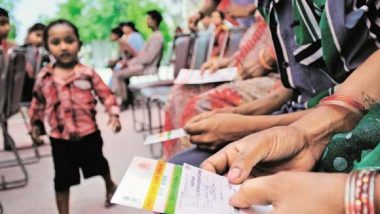New Delhi, Sep 26: The Supreme Court on Wednesday upheld the constitutional validity of Aadhaar and said that it empowers the marginalised sections of the society. The Court said Aadhaar is mandatory for PAN linking but is not needed for opening a bank account. It said Aadhaar linking to mobile number is not needed and ordered that no mobile company can demand Aadhaar details from its customers. The Court further added that Aadhaar need not be made compulsory for school admissions as school admissions not a benefit under Section 7.
It added saying that the benefits and services under Section 7 should be of the nature of welfare schemes targeted at a particular deprived community. The Apex Court will shortly pronounce its crucial verdict on a batch of pleas challenging the constitutional validity of Centre's flagship Aadhaar scheme and its enabling 2016 law.
Supreme Court Justice Sikri while reading out the verdict on the constitutional validity of Aadhaar said that there is a fundamental difference between Aadhaar card and identity. Once the biometric information is stored, it remains in the system. Justice AK Sikri says, "Aadhaar empowers the marginalised section of the society and gives them an identity, Aadhaar is also different from other ID proofs as it can't be duplicated". Catch LIVE Updates of Aadhaar Verdict by Supreme Court.
Sikri observed that the Supreme Court said that minimal demographic and biometric data of citizens are collected by UIDAI for Aadhaar enrolment and Aadhaar eliminates any chance of duplication. Sikri also states that enrolment was foolproof. Aadhaar collects minimum possible data, he says, adding that the unique identification proof also empowers and gives identity to marginalised sections of the society.
Of the five judges, Justices AK Sikri, DY Chandrachud and Ashok Bhushan will pronounce three separate opinions. No separate judgments will be authored by CJI Dipak Misra and Justice Khanwilkar. Justice AK Sikri will be pronouncing the judgment first, followed by Justice DY Chandrachud, and the Justice Ashok Bhushan. Aadhaar Declared Constitutionally Valid by Supreme Court, But It's Not Mandatory to Link it With Bank Accounts, Mobile Numbers.
Here are the key takeaways from the Supreme Court's Judgment:
- Justice AK Sikri said, "Aadhaar has become the most discussed subject in recent past. It is better to be unique than to be best because being the best makes u number one but being unique makes u the only one. Aadhaar is based on being unique”.
- Justice AK Sikri asks Centre to "introduce strong data protection law as soon as possible"
- Justice Sikri further says that Aadhaar performs authentication role. "Aadhaar number given to a person is unique and cannot go to any other person," he says.
- Justice AK Sikri says, "Aadhaar empowers the marginalised section of the society and gives them an identity, Aadhaar is also different from other ID proofs as it can't be duplicated"
- "Uniqueness is the fundamental difference between Aadhaar and other identity proofs. The unique identity card empowers marginalized sections by giving them an identity," Justice Sikri says as he discusses arguments of the parties.
- Sikri said that there is a fundamental difference between Aadhaar card and identity. Once the biometric information is stored, it remains in the system
- Sikri said the unique identification proof also empowers and gives identity to marginalised sections of the society. He said the main plank of a challenge to Aadhaar project and Act is that it infringes Right to Privacy
- Justice Chandrachud observed that Unique nature of biometric data is compromised, it will be compromised forever. Many provisions of the Aadhaar Act provide for invasive collection of biometric data. There is no clarity on what happen if there is a mismatch of biometric data.
- Chandrachud said that Aadhaar Act cannot be passed as money bill. "Passing of bill as money bill when it does not qualify as a money bill is a fraud on Constitution, violates Basic Structure," Chandrachud added.
- Chandrachud said allowing private players to use Aadhaar will lead to profiling which could be used in ascertaining political views etc of citizens.
- Chandrachud added that the constitutional guarantees cannot be left to risks posed by technological advancements and absence of independent regulatory framework compromises data protection. He said Aadhaar Act, therefore, cannot pass tests under Article 14.
A five-judge constitution bench headed by Chief Justice Dipak Misra had on May 10 reserved the verdict on the matter after a marathon hearing that went on for 38 days, spanning four-and-half months. When the judgement was reserved by the court, Attorney General K K Venugopal had told the bench, which also comprised Justices A K Sikri, A M Khanwilkar, D Y Chandrachud and Ashok Bhushan, that this matter had become the "second longest" one in terms of days of hearing after the historic Kesavananda Bharati case of 1973.
(The above story first appeared on LatestLY on Sep 26, 2018 12:10 PM IST. For more news and updates on politics, world, sports, entertainment and lifestyle, log on to our website latestly.com).













 Quickly
Quickly


